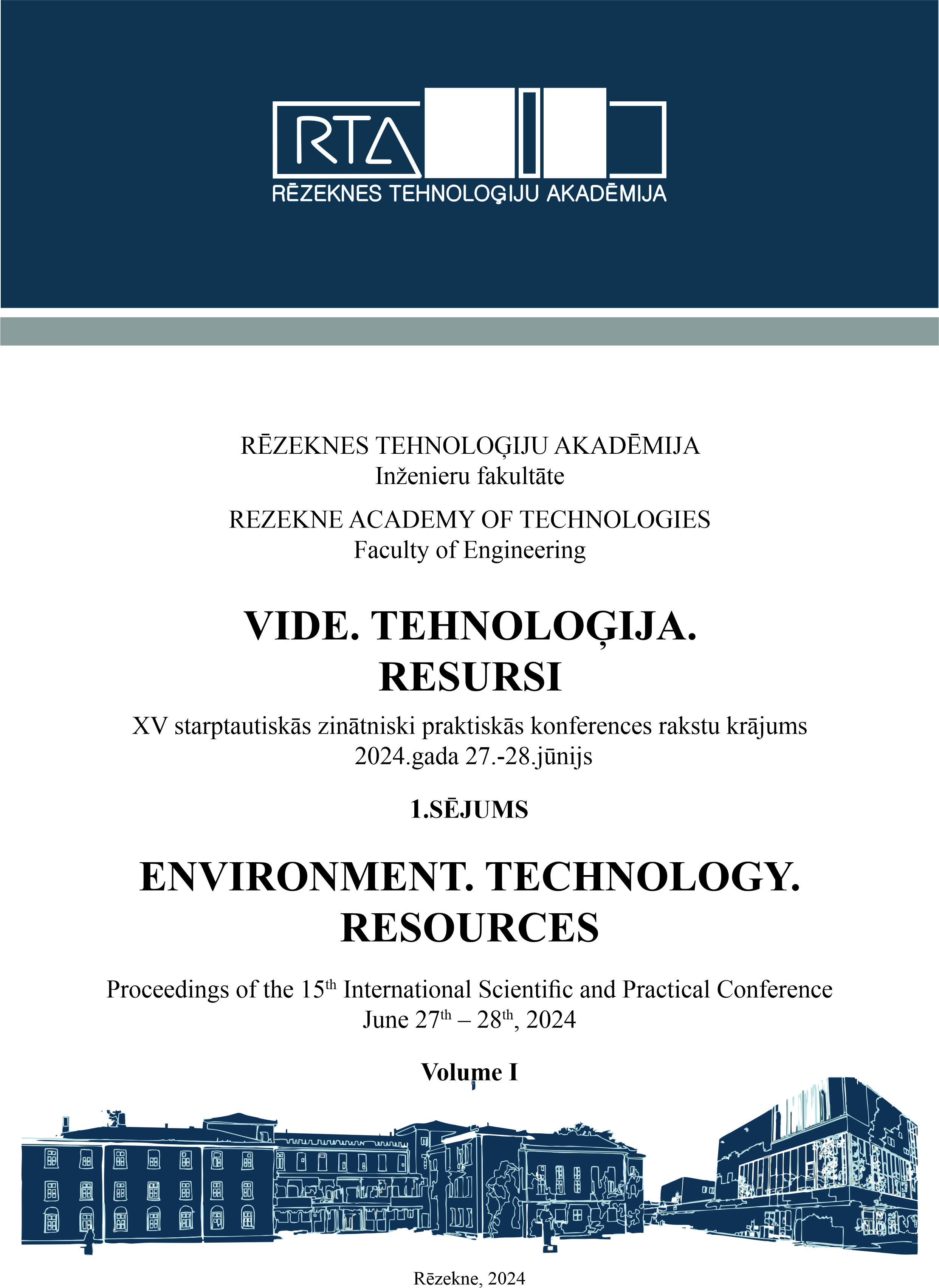MECHANICAL BEHAVIOR AND STIFFNESS OF A POLYURETHANE BUSHING OF A PASSENGER CAR SUSPENSION
DOI:
https://doi.org/10.17770/etr2024vol1.7996Keywords:
experimental, FEA, polyurethane bushing, stiffness, suspensionAbstract
Suspension bushings play an important role in reducing vibrations, minimizing noise, absorbing road irregularities, and controlling joint movements. Polyurethane bushings, in particular, contribute to improved vehicle handling, exhibiting lower moments of inertia and greater strength under increased loads. However, this enhancement in performance may come at the expense of reduced ride comfort. This paper presents the results of a study on the mechanical characteristics of polyurethane material and the stiffness of bushings made from the same material, specifically in the context of the MacPherson front independent suspension. To achieve this, mechanical tension tests were conducted on polyurethane specimens, obtaining stress-strain curves. Additionally, a three-dimensional geometric model of the polyurethane bushing was created using the SolidWorks software. The paper presents the results of bushing stiffness obtained through nonlinear Finite Element Analysis (FEA). Experimental determination of radial stiffness was also performed, and the results were compared for validation.
Downloads
References
D. Lalo and M. Greco, “Rubber bushing hyperelastic behavior based on shore hardness and uniaxial extension”, 24th ABCM International Congress of Mechanical Engineering, December 3-8, 2017, Curitiba, PR, Brazil, https://www.researchgate.net/publication/323203919.
J. Rivas-Torres, J. C. Tudon-Martinez, J. Lozoya-Santos, R. A. Ramirez-Mendoza, and A. Spaggiari, “Analytical Design and Optimization of an Automotive Rubber Bushing”, Hindawi, Shock and Vibration, Volume 2019, Article ID 1873958, 13 pages, https://doi.org/10.1155/2019/1873958.
Gang Lei, Qian Chen, Ying Liu, and Jingjing Jiang, “An Inverse Method to Reconstruct Complete Stiffness Information of Rubber Bushing”, Hindawi Publishing Corporation, Advances in Materials Science and Engineering, Volume 2013, Article ID 187636, 6 pages, http://dx.doi.org/10.1155/2013/187636.
M. Tărrago, L. Kari, J. Viṅolas, and N. Gil-Negrete, “Torsion stiffness of a rubber bushing: a simple effective engineering formula including amplitude dependence”, Article in The Journal of Strain Analysis for Engineering Design, Volume 42 Issue 1, January 2007, DOI: 10.1243/03093247JSA246.
A. N. Gent, Engeneering with Rubber: How to Design Rubber Components, Hanser Publishers, Munich, 2012.
L. Kunchev and Z. Georgiev, “Method for experimental determination of the coefficients of stiffness and damping of rubber insulators”, IOP Conf. Series: Materials Science and Engineering, 618 (2019), doi:10.1088/1757-899X/618/1/012057.
K. Srinivas, “Mechanical characterization testing of thermoplastics and composite materials”, 2020, https://www.researchgate.net/publication/339872757.
S. Kayaci and A. K. Serbest, “Comparison of constitutive hyper-elastic material models in finite element theory”, Otekon, 6. Otomotiv Teknolojileri Kongresi, Bursa, pp. 121-125, 2012.
K. Srinivas, “Non-linear finite element analysis of elastomers”, 2017, https://www.researchgate.net/publication/305778547.
K. Srinivas, “Verifications and Validations in Finite Element Analysis (FEA)”, 2020, https://www.researchgate.net/publication/341727057.
T. S. Gaaz at al., “Mechanical Studies on Polyurethane (PU)-Starch Nanocomposites”, https://www.researchgate.net/publication/262197567.
https://www.iqsdirectory.com/articles/polyurethane-molding/polyurethane-bushings.html.
B. Duleba, F. Greškovič, and T. Jachowicz, “Possibility of manufacturing of race polyurethane bushings using rapid prototyping and prototype molds”, Transfer inovácií 24/2012.
M. Cerit at al., “Investigation into effect of rubber bushing on stress distribution and fatigue behaviour of anti-roll bar”, Engineering Failure Analysis Volume 17, Issue 5, July 2010, Pages 1019-1027, https://doi.org/10.1016/j.engfailanal.2010.01.009.
S. Bhandiagare at al., “Analysis of effect of Polyurethane Bushing on stress distribution of Anti-Roll Bar”, International Journal of Engineering Research and General Science Volume 4, Issue 3, May-June, 2016, ISSN 2091-2730, pp. 90 – 96.
K. Junik at al., “Impact of the hardness on the selected mechanical properties of rigid polyurethane elastomers commonly used in suspension systems”, Engineering Failure Analysis, Volume 121, March 2021, 105201, https://doi.org/10.1016/j.engfailanal.2020.105201.
Downloads
Published
Issue
Section
License
Copyright (c) 2024 Stiliyana Taneva, Stanimir Penchev, Krasimir Ambarev

This work is licensed under a Creative Commons Attribution 4.0 International License.


